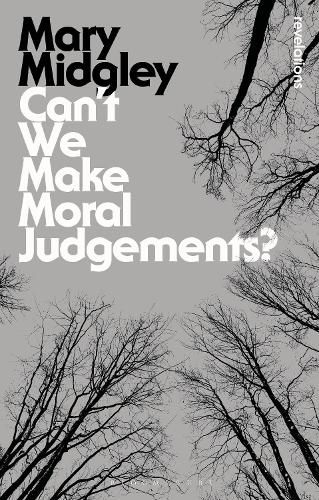Readings Newsletter
Become a Readings Member to make your shopping experience even easier.
Sign in or sign up for free!
You’re not far away from qualifying for FREE standard shipping within Australia
You’ve qualified for FREE standard shipping within Australia
The cart is loading…






How many times do we hear the statement ‘It’s not for me to judge’? It conveys one of the most popular ideas of our time: that to make judgements of others is essentially wrong. In this classic text, the renowned moral philosopher Mary Midgely turns a spotlight on the ever popular stance in society that we should not make moral judgements on others. Guiding the reader through the diverse approaches to this complex subject, she interrogates our strong beliefs about such things as the value of freedom that underlie our scepticism about making moral judgements. She shows how the question of whether or not we can make these judgements must inevitably affect our attitudes not only to the law and its institutions but also to events that occur in our daily lives, and suggests that mistrust of moral judgements may be making life even harder for us than it would be otherwise. The texts and philosophers discussed range from Nietzsche and Sartre to P.D. James and the Bhagavad Gita. The Bloomsbury Revelations edition includes a new preface from the author.
$9.00 standard shipping within Australia
FREE standard shipping within Australia for orders over $100.00
Express & International shipping calculated at checkout
Stock availability can be subject to change without notice. We recommend calling the shop or contacting our online team to check availability of low stock items. Please see our Shopping Online page for more details.
How many times do we hear the statement ‘It’s not for me to judge’? It conveys one of the most popular ideas of our time: that to make judgements of others is essentially wrong. In this classic text, the renowned moral philosopher Mary Midgely turns a spotlight on the ever popular stance in society that we should not make moral judgements on others. Guiding the reader through the diverse approaches to this complex subject, she interrogates our strong beliefs about such things as the value of freedom that underlie our scepticism about making moral judgements. She shows how the question of whether or not we can make these judgements must inevitably affect our attitudes not only to the law and its institutions but also to events that occur in our daily lives, and suggests that mistrust of moral judgements may be making life even harder for us than it would be otherwise. The texts and philosophers discussed range from Nietzsche and Sartre to P.D. James and the Bhagavad Gita. The Bloomsbury Revelations edition includes a new preface from the author.